29 Dec 2014
How Many People Use Medical Marijuana?
Medical marijuana is the term commonly used to describe the plant-based drug marijuana when consumed as a treatment under the direction of a physician. Despite the known effectiveness of the drug in limited medical contexts, many researchers and public health experts express a legitimate concern that medical marijuana use may contribute to increased marijuana-related harm in the larger population.
In a study published in September 2014 in the journal Drug and Alcohol Review, researchers from the U.S.-based Public Health Institute sought to estimate how many people in California, a state with a widely-developed medical marijuana program, consume marijuana/cannabis in a medical context.
Medical Marijuana – THC And CBD
Marijuana contains two prominent active ingredients, THC (tetrahydrocannabinol) and CBD (cannabidiol). THC is largely responsible for the mind-altering effects closely associated with marijuana/cannabis use. CBD does not have any substantial mind-altering impact. Both THC and CBD have potential usefulness in a medical context.
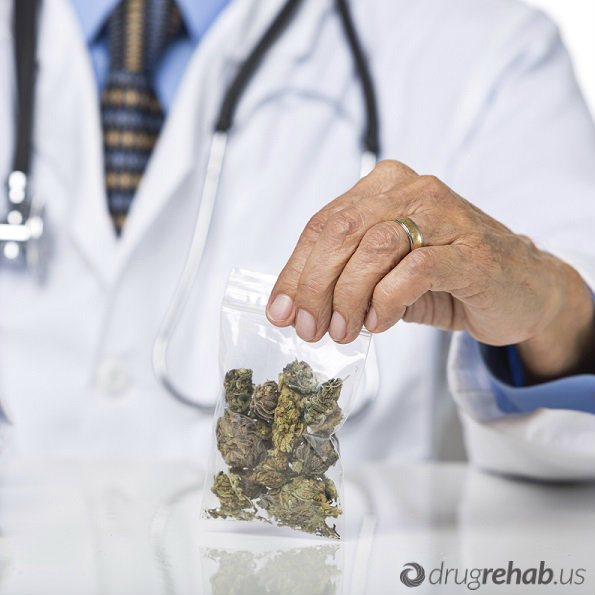 Scientifically supported medicinal properties of THC include nausea reduction and stimulation of appetite; other potential, less supported properties include the easing of inflammation and pain, as well as the reduction of muscle spasms.
Scientifically supported medicinal properties of THC include nausea reduction and stimulation of appetite; other potential, less supported properties include the easing of inflammation and pain, as well as the reduction of muscle spasms.
Scientifically supported medicinal properties of CBD include inflammation and pain relief, as well as seizure relief; the chemical may also help ease the severity of psychotic mental states.
Some medical marijuana growers sell products high in THC, while others sell low-THC products that rely on CBD for their effectiveness. However, without a thorough, case-by-case chemical analysis, no one can say how much of either chemical any given batch of marijuana/cannabis contains.
Among other things, this means that there is no such thing as “standard” dose of medical marijuana. For this and other reasons, the U.S. Food and Drug Administration does not recognize marijuana as a medical treatment.
In addition, federal law prohibits the sale or possession of marijuana and other forms of cannabis. Despite these facts, 22 U.S. states and the District of Columbia have laws in place that legalize marijuana/cannabis use as a treatment for certain ailments if a licensed physician issues a prescription.
Marijuana-Related Harm
Within or outside of a medical context, marijuana/cannabis use can lead to a number of significant health problems. For example, roughly 11 percent of all Americans who use the drug will eventually develop a diagnosable cannabis addiction. Addiction risks are especially elevated for people who use the drug habitually (as may be the case for medical marijuana consumers), as well as for people who begin their marijuana intake in adolescence.
Despite CBD’s potential to ease psychosis symptoms, heavy marijuana consumption is clearly linked to increased risks for experiencing psychotic episodes; in addition, regular consumers of the drug develop mental illness in general at a higher rate than the rest of the U.S. population.
Risks On Teen Marijuana Consumers
Apart from heightened risks for addiction, teen marijuana consumers have age-specific risks that include disrupted brain development, learning and memory impairment and an overall drop in intellectual skill. Physical ailments linked to marijuana use include lung infections, chronic bronchitis and heart disease.
How Many People Use Medical Marijuana?
California is one of the U.S. states that permits the sale of medical marijuana and the establishment of widely accessible dispensaries dedicated to medical marijuana distribution. In the study published in Drug and Alcohol Review, the Public Health Institute researchers used information gathered from the 2012 version of an ongoing project called the California Behavioral Risk Factor Surveillance System to estimate how many adult Californians report using marijuana in a medical context. A total of 7,525 randomly selected people took part in this phone-based project.
The researchers concluded that roughly 5 percent of California adults have used medical marijuana at least once. Demographically speaking, two groups of individuals are more likely to use marijuana in a medical context: young adults between the ages of 18 and 24 (also the group most likely to participate in recreational marijuana use) and adults with primarily European racial/ethnic ancestry.
However, medical marijuana use also occurs to some extent in every other demographic group, including men, women, people from various parts of the state, people with varying degrees of educational accomplishment and people from all other racial/ethnic backgrounds.
The study’s authors emphasize the fact that, although medical marijuana use is limited overall in California, people from all walks of life report using marijuana/cannabis in a medical context. The authors also emphasize the need to monitor the extent of marijuana-related harm in people who report using marijuana as a form of medicine. This is especially true since the availability of medical marijuana will likely increase in the future.
25 Dec 2014
How To Cope With Protracted Withdrawal
You’ve been through rehab and counseling for your addiction. You went through the terrible symptoms of acute withdrawal during detox when you thought you would never get relief. You are in recovery now, attending support group meetings and trying to carry on with your life. You were sure that by this point in your sobriety you would be feeling better, like a whole new person.
Unfortunately, you feel terrible. You could be going through protracted withdrawal, the persistence of withdrawal symptoms after they should have cleared. Instead of giving in to the urge to use in order to find relief, work through these symptoms and stay sober.
Protracted Withdrawal
What you experience during detox is acute withdrawal. Your body reacts to the elimination of the drug or alcohol and leaves you with intense cravings and other awful symptoms. Many addicts give in during this phase, especially if they have no support to get through it. Once you have completed detox, you probably thought those feelings and symptoms were over. If they persist at a lower intensity, you could be experiencing protracted withdrawal.
Symptoms Of Protracted Withdrawal
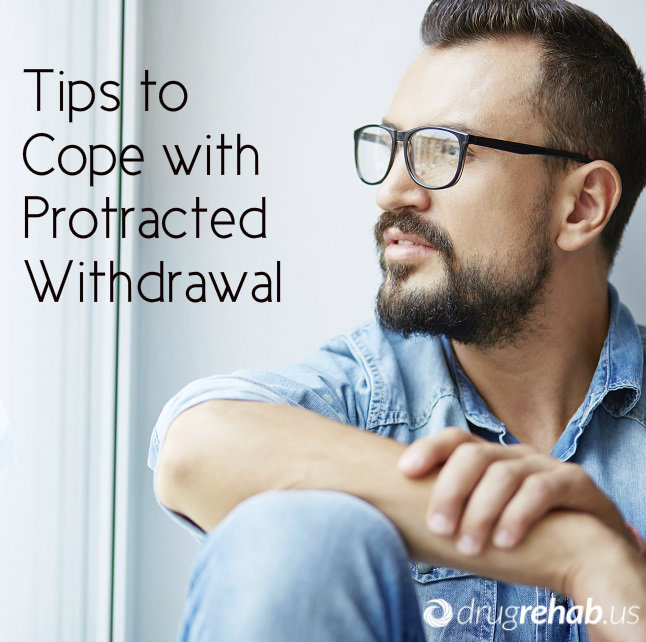 Symptoms of this condition have been seen with opioids, methamphetamine, marijuana, benzodiazepines and cocaine and include:
Symptoms of this condition have been seen with opioids, methamphetamine, marijuana, benzodiazepines and cocaine and include:
- Insomnia
- Depression
- Fatigue
- Anxiety
- Cravings
- Difficulty concentrating
- Memory difficulties
- Irritability
- Loss of sex drive
- Unexplained physical pains
How an addict experiences protracted withdrawal is unique, but these are some of the possible symptoms that have been recorded. You may be feeling any of these or just feeling generally bad and down.
Tips On How To Cope With Protracted Withdrawal
Talk To Your Doctor
If you still aren’t feeling well long after detox, talk to your doctor and any other health professionals with whom you are working. Your doctor can go over your symptoms and eliminate any other possible health problems that could be causing your symptoms. If your health team determines that you are going through protracted withdrawal, there are things you can do to speed up your healing process and help you get through the struggle without giving in to a relapse.
Understand It Will Not Last Forever
First and foremost, understand that it will not last forever. It may seem like it now, but protracted withdrawal will ultimately end. To assure yourself of this, read up on the subject and talk to your doctor and therapist about your concerns. If any of your symptoms are related to mental health issues, such as depression or anxiety, seek professional help. Work with your therapist or a new specialist to target these particular problems. Your doctor may also be able to prescribe medications to help. It may seem counterintuitive for an addict, but there are new developments in drugs that can help opioid and alcohol addicts in particular.
Partake In Healthy Habits
Train yourself to engage in healthy habits. Being healthy will help you feel better even as your withdrawal symptoms persist. Anything you can do to improve your physical health will help. This means getting enough sleep every night, eating a nutritious and complete diet and getting plenty of regular exercise. Social support is helpful too, so enlist a buddy to make positive health changes with you or at least to exercise with you.
Continue Addiction Treatment And Be Patient
Finally, be sure to continue with your addiction treatment. Even if you completed a lengthy stay in rehab, you know that addiction requires follow up and regular care. Go to support group meetings and continue with regular therapy sessions. Remember to be patient. You are going through a difficult time, and you probably expected to feel better by now. You will feel better. Put in the work, stay healthy and continue your treatment.
Is It Post-Acute Withdrawal Syndrome Instead? Find Out Now!
Don’t Beat Yourself Up – Everyone Is Different And Will Recover Differently!
For Additional Help – Call Us Now!
22 Dec 2014
How To Drag A Family Out Of Denial
Denial is a powerful force, not for change, but for maintaining the status quo. We tend to think of the addict as being the one in denial, but often the people around her are also heavily in denial about the problem. Denial is something that can be useful at times. It may keep us sane in the face of something terribly traumatic. Most of the time, however, denial keeps us from making positive changes.
If you have an addict in the family and everyone else denies that there is a problem, make an effort to drag them out of their inertia to help your loved one.
Denial And Addiction
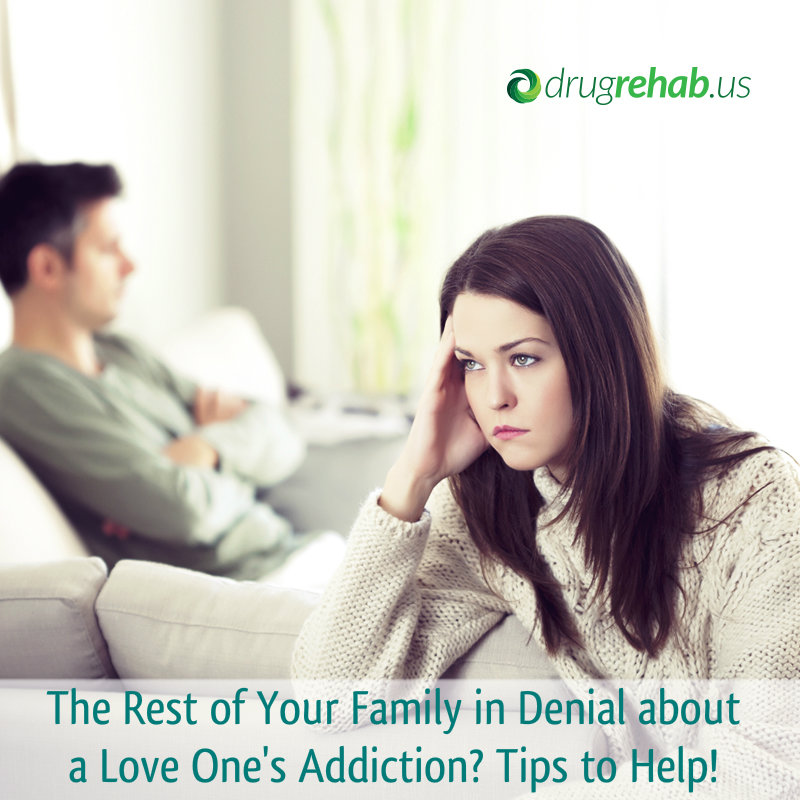 Denial is a common feature of addiction. It allows the addict to make excuses and keep using. Addicts often keep themselves in denial and can’t get help until they fully admit to having a problem.
Denial is a common feature of addiction. It allows the addict to make excuses and keep using. Addicts often keep themselves in denial and can’t get help until they fully admit to having a problem.
On the other side of the coin are the loved ones in denial. It’s understandable to see this happen. Parents, for instance, may find it impossible to admit their child is a chronic drug user or an alcoholic. Other members of the family may be in denial because conflict within the family changes the dynamic and upsets the balance.
These family members may think they are keeping everything on an even keel, but the truth is they are only enabling the addict. They are making the situation worse and allowing the addict to continue on a downward spiral. If you are the one family member not in denial, it may be very difficult to speak up. You are the one rocking the boat and everyone else reacts as if you’ve lost your mind.
How To Break Through Family Denial
If you really care about your loved one and your family, you can try to break down the wall of denial. Remember that you may not be successful. You can only do so much, and you can’t force people to change. The best you can do is to try to change their minds, convince them to see the truth and offer your love and support to the addict.
- Show that you are serious – It isn’t easy to go against what everyone else is seeing. If you have been quietly putting a bug in the ear of anyone who will listen, it’s time to step up and take a bolder stand. Hold a family meeting without the addict. Confront your family head on and show them that you mean business. This straightforward approach may jolt some of your family members out of complacency.
- State the facts – Before you hold the meeting, prepare a list of facts. Present your family with concrete examples of how your loved one displays the signs of addiction. Lead with facts rather than emotions and they may take you more seriously.
- Remain calm and be patient – Give your family time to let the facts sink in. If no one gives up his or her denial immediately, don’t get frustrated. Let it go for a few days and then come back to family members individually. You may find that some are prepared to listen to you now.
- Offer help – When all else fails and your family remains in denial, give your love and support to the addict. You can’t always change minds, but you can offer your help. Tell your addicted loved one that you are there for her when she is ready and have resources for treatment prepared.
Denial may be powerful, but so is the care and love you have for your family. Do what you can to break through the denial, but recognize when you can do no more.
Find Out If You Are An Enabler And How To Stop Enabling Now!
Your Addicted Loved One & Your Family Are Worth It – Call Us Now For Help
Including Help Setting Up An Intervention !
18 Dec 2014
The Fight Against Stigma For Pregnant Addicts
Babies born to addicted mothers can face a very difficult start in life. When a pregnant woman is addicted to drugs and continues to use, her baby will come into this world with drugs in his or her system. A newborn who is exposed to drugs such as opiates or narcotics while in the womb will be born with a variety of problems know as neonatal abstinence syndrome.
Drugs like heroin, cocaine or oxycodone pass through the placenta from mother to baby. During pregnancy, the growing baby develops into an addict. Upon birth, the baby is immediately craving drugs, and doctors will have to give the baby drugs that are the same or very similar to the ones taken by the mother to try to ease inevitable withdrawal symptoms. Drug-addicted babies are typically inconsolable. Symptoms of neonatal abstinence syndrome can last from several weeks to several months.
In a perfect world, women who are addicted to drugs would be able to quit using before ever getting pregnant. But it’s rarely that easy to discontinue using drugs. Even when an addict knows she is pregnant and may be harming her child, the compulsion to do drugs is still there.
Difficulties Of Being Pregnant And Addicted
 It’s a growing problem, and there aren’t easy solutions. Programs aimed at helping pregnant women overcome their drug problems are often discontinued or reduced because of funding cuts. Even when programs are available to help pregnant addicts, the women are often afraid to reach out for help.
It’s a growing problem, and there aren’t easy solutions. Programs aimed at helping pregnant women overcome their drug problems are often discontinued or reduced because of funding cuts. Even when programs are available to help pregnant addicts, the women are often afraid to reach out for help.
There is a lot of stigma attached to addiction in pregnancy. Non-addicts are quick to assume that addiction is a choice, and that an addict could stop using if she really wanted to. In some states, using drugs while pregnant may even be considered a crime. In Tennessee, for example, drug use while pregnant is classified as an assault.
When a pregnant addict is arrested instead of offered help, it gives a message to other pregnant addicts that it may be dangerous to try to get help. Many try to detox on their own, which can be extremely dangerous and even life-threatening. Fear of legal consequences, such as losing custody of their other children, stops many women from reaching out for help from medical professionals. Another fear is that the newborn baby will be taken away at birth. So a large number of pregnant addicts continue to suffer in silence.
De-Stigmatizing Addiction In Pregnancy
There are few families that haven’t been touched by addiction in some way. Yet most pregnant addicts are unsure whom it would be safe to talk to, if anyone. Many of them suffer through their entire pregnancies scared and alone. They may continue to abuse drugs because it is the only life they know, or they may try to quit drugs without help, a goal that is rarely successful.
Addiction is frequently misunderstood, and often people see it as a moral failing rather than an illness. This judgmental attitude is intensified when an unborn child may be affected.
If stigma could be removed from addiction in pregnancy, both mothers and babies would benefit. If pregnant addicts were free to seek help and know they wouldn’t be judged or condemned, they could approach motherhood with strength and courage rather than fear and shame.
When pregnant addicts avoid getting help, it is really a form of denial. Addicts and their families may try to pretend that if they ignore the problem of addiction, it will go away. Pregnant addicts learn to lie to their doctors and hide any evidence that they are actively abusing drugs.
Stigma prevents addicts from obtaining good prenatal care and results in babies who are born addicted. These babies may also be born with other medical problems. Many of these problems would be prevented if the mothers were free to get help and didn’t have to live in fear of asking for it.
Few understand the hold addiction has on people and how hard it can be to overcome the compulsion to turn to mind-altering drugs. Addiction is a disease, and women who suffer from it deserve to have options for recovery without fear of stigma or judgment. So do their unborn children.
Why Do Women Continue To Drink During Pregnancy? – Understand More About Why Woman Use While Pregnant
15 Dec 2014
Jail vs. Rehab For Addicts
Millions of drug addicts are jailed every year in the U.S. In many of these cases, they are sentenced to jail time because of minor crimes such as possession or a third strike. Rehab vs. jail is an old debate, but one that is shifting. While the old way has been to jail addicts because they have committed crimes, advocates for addicts are changing attitudes. Jail is not a valid form of rehab and it should stop being used as such. Addicts do not come out of jail cured simply because access to drugs was restricted or cut off; it’s time to start getting addicts the help they truly need.
Can Jail Be Rehab?
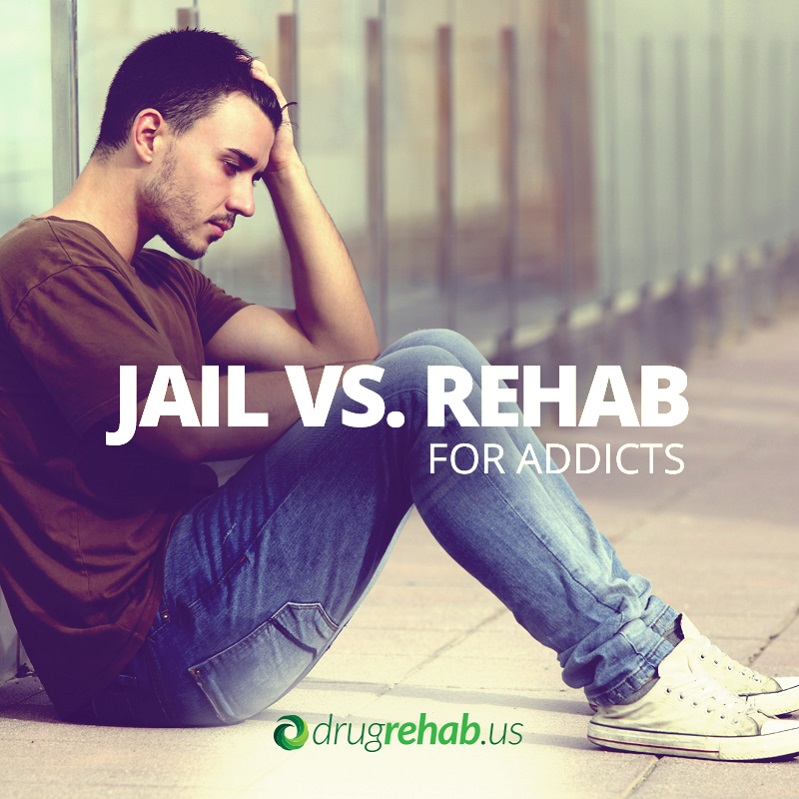 Philosophies of addiction treatment have long been punitive. Even with addicts who are not in trouble with the law, mainstream addiction care has often used punishment and tough love as a way to treat patients. This idea comes from a deep-seated belief that addiction is a moral failure and a personal weakness; that addicts have done something wrong because of an internal flaw and punishment is the way to correct it. This attitude is old and it is changing, but it still largely prevalent.
Philosophies of addiction treatment have long been punitive. Even with addicts who are not in trouble with the law, mainstream addiction care has often used punishment and tough love as a way to treat patients. This idea comes from a deep-seated belief that addiction is a moral failure and a personal weakness; that addicts have done something wrong because of an internal flaw and punishment is the way to correct it. This attitude is old and it is changing, but it still largely prevalent.
Because of this dated attitude, many addicts are sentenced to jail time instead of treatment in a rehab facility. Drug rehabilitation statistics refute this practice. Jail might work as effective rehab for a handful of addicts, but for most it simply doesn’t help. When a drug addict leaves prison, he is likely to start using again. Unless a jail or prison has a dedicated drug addiction treatment program, addicts will not be well served by spending time there.
Addicts Need Effective Treatment
No one would suggest that there should be no consequences for drug crimes, but jail time is not the most effective way to punish and rehabilitate addicts. Those convicted of minor and non-violent crimes could be sentenced to time spent in a treatment facility instead of prison. This would allow addicts to get the help they desperately need and would help them transform back to productive members of society who will be unlikely to break laws again.
One of the pros of recreational marijuana legalization that has recently been seen in Colorado and Washington is fewer drug users going to jail for minor crimes. There are a lot of real downsides to legalizing this drug, including possibly increased addiction rates, but if it means clearing prisons of non-violent drug offenders, it would be one positive outcome.
The debate over rehab vs. jail is one that should be officially closed. We know that prison time does not treat addicts and that no one is served well by jails overcrowded with minor offenders. Everyone would benefit, taxpayers and drug addicts alike, if we could send non-violent drug offenders to facilities for effective treatment.
Find Out For Yourself Or A Loved-One Which Therapy Will Work Best In – What Kind Of Addiction Therapy Do You Need? – And Break Free From Addiction Today!
11 Dec 2014
Coping With A Chronic Relapser
Helping a loved one overcome addiction is challenging. First you have to convince her that she has a problem, which may seem like an insurmountable obstacle. Once she is ready to admit to her addiction and get help, you have to support her as she goes through rehab. Finally, your loved one is prepared to re-enter the world as a sober person in recovery. And then she relapses, again and again and again. After lending so much support, how do you help the chronic relapser in your life?
Understanding Relapse
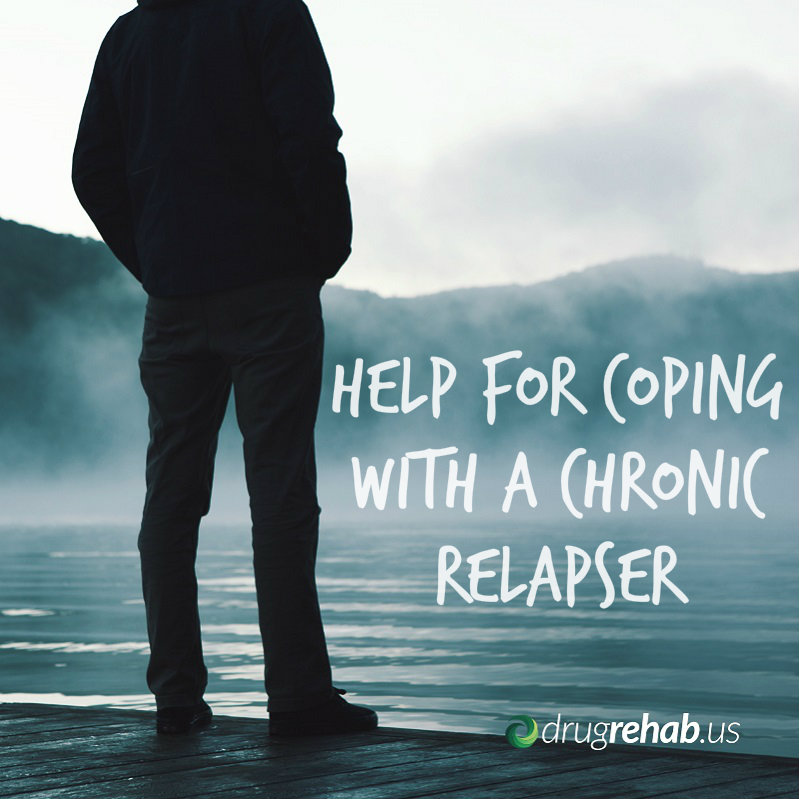 As someone who does not have an addiction or substance abuse problem, it can be difficult to appreciate what your loved one is going through. It may help you to feel better, and to be better able to help her, if you educate yourself about this disease. The old-fashioned idea about addiction is that the addict always has a choice and that if she fails at being sober, she is weak-willed and inferior.
As someone who does not have an addiction or substance abuse problem, it can be difficult to appreciate what your loved one is going through. It may help you to feel better, and to be better able to help her, if you educate yourself about this disease. The old-fashioned idea about addiction is that the addict always has a choice and that if she fails at being sober, she is weak-willed and inferior.
Research over the last couple of decades has changed that long-standing view of addiction. We now know that it is a chronic illness and has much in common with other chronic medical conditions like diabetes or arthritis. The most important characteristic of chronic illnesses that you must understand is relapse. Relapse is common and almost inevitable in all chronic diseases. These illnesses require lifelong treatment, and even then relapse may still occur.
Continuing Support Toward Your Loved One Who Is Relapsing
Knowing more about addiction and its chronic nature may help you to be more compassionate toward your loved one who is relapsing. Even so, it can be frustrating to see her repeatedly go back to substance abuse. You have a choice as to whether you continue to support her or not. Most addiction experts would urge you to continue to be there for her. Many addicts require several tries at rehab and focused treatment before relapses stop or become less frequent.
If you have the means to keep supporting your loved one, do so. She needs you. Help her in any way possible. That may mean helping her to pay for treatment, helping her to find new treatment programs that are more successful for her, or giving her a supportive place to stay after rehab. Just remember to take care of yourself as well. Don’t give more than you can afford to, financially, emotionally or otherwise. And make sure you are not enabling by making excuses for your loved one or providing financial help for their habit.
Walking Away From A Chronic Relapser
Your other option when coping with a chronically relapsing loved one is to walk away and withdraw your support. It seems like a harsh option, but there are some valid reasons to make this choice. If you feel completely drained, worn out or used up from helping her, you may need hiatus. Take a few weeks to heal yourself and tell her that you will support her once again, but that you need a break.
Another reason you may need to walk away, and maybe do so for good, is if your loved one is taking advantage of you and causing you harm. Maybe she is stealing from you. She might be verbally or physically abusive, or perhaps puts you or your children at risk by bringing drugs and dangerous people to your home. How you choose to cope with a loved one who can’t seem to stay sober is personal. Consider your options and make the choice that is best for you and your family. There is only so much one person can give.
Women And Men Have Unique Needs When Coping With Relapse. Check Out These Beneficial Tips To Cope With Relapse As A Woman – You Are Not Alone!
In June of 2014, the Delaware News Journal partnered with Christiana Care to host a forum on the heroin crisis gripping the state, but several questions from audience members were left unanswered. Panelists at the event willing to work with the Delaware News Journal have offered to answer some of these questions in an ongoing feature, and Don Keister, co-founder of the anti-addiction group atTAck and whose son died of heroin addiction in 2012, has stepped forward for the task. The question he answered revolved around what you should do when an adult child who lives with you—and has children of his or her own—is struggling with addiction but won’t get help, and his response offers important advice to anybody suffering similar issues.
The Three Cs For Family Members Of Addicts
Keister offers a core piece of advice from Al-Anon: remember the three Cs.
You didn’t cause it,
you can’t control it
and you can’t cure it.
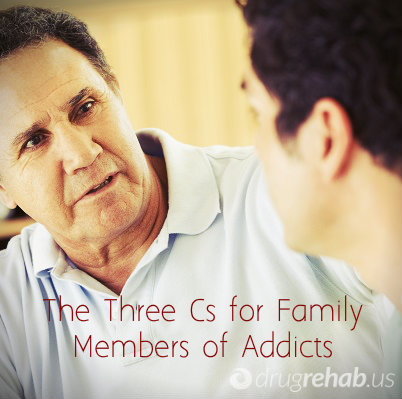 If someone you care about is suffering from addiction, there’s an inclination to try to take too much on your shoulders or even to feel guilt, but this is unhealthy.
If someone you care about is suffering from addiction, there’s an inclination to try to take too much on your shoulders or even to feel guilt, but this is unhealthy.
You’re in no way responsible for what is happening. It’s only natural to want to fix the problem for your child, but addiction isn’t like a scraped knee or a period of minor financial trouble: it’s not something you can rectify for them.
By trying, all you’ll do is make yourself more stressed and unhappy. It may seem puzzling given the situation, but you need to care for yourself as well as your family member.
That’s the real purpose of the three Cs: you need to truly understand that you aren’t to blame, and you can’t heap all the responsibility onto your own shoulders.
No Single Solution To Recovery
Sadly, there isn’t a single road you must follow to recovery. You need to think about what works for you and your family as individuals, but it is important that you’re there to offer support. You need to continue to love your child, and of course the same goes for your grandchildren.
Although you can’t force somebody to get help, you should do whatever you can to support and encourage your son or daughter to go into recovery. Even if your child won’t get help, you shouldn’t blame him or her for the issue either; addiction has many causes and it isn’t productive to become angry with or resentful of somebody struggling with it. Your child always needs to know you’re acting out of love and concern for his well-being.
Addiction As A Family Disease
Keeping all of that in mind, it’s important you recognize that addiction is a disease that affects entire families. The most obvious affected parties are your grandchildren: your son or daughter is unlikely to be capable of offering the level of parental care they need, and this is one area where your support is invaluable.
However, as the three Cs point out, you need to care for yourself too. The challenge is staying as healthy as you can while still being there to help the entire family unit—including the addict—get through this together. This is especially important if you’re all living together, but it makes it all the more difficult to avoid taking too much responsibility yourself.
Importance Of Getting Additional Recovery Support
That’s why getting additional recovery support is essential. Even if the addicted individual won’t get help, groups like Al-Anon exist to offer support to the loved ones of addicts, and can help you get through the problems you’re facing. Addiction isn’t easy for anybody in the family, and if you’re having difficulty, help is available.
Keister’s advice might not have been what you were hoping for, but it’s realistic, and attests to his personal experience with the problem. As much as you may want an easy fix, it doesn’t really exist. Things can and hopefully will get better, but until then, all you can do is be as supportive as possible and make sure you look after yourself, too.
If You Need Help With A Family Member’s Addiction – Call Us Now!
04 Dec 2014
What’s The Deal With Edible Pot?
Marijuana is often in the news these days, especially if you live in Colorado or Washington where pot is now legal for recreational use. For those of us not living in one of these two states, we are still hearing the tales of legal pot in the national news. Other states will be voting on legalization, and it’s important to hear what’s happening. Right now, edible marijuana is at the forefront. What does it mean and why is it in the news? What do you need to know about it and should you be worried?
Marijuana Edibles
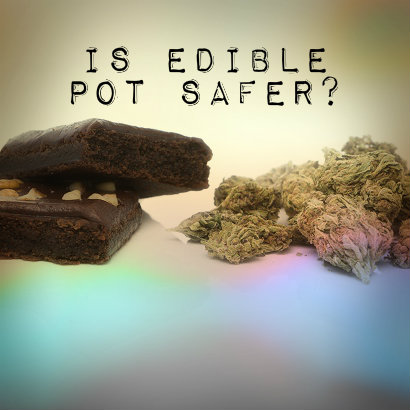 Marijuana is a drug that comes from the cannabis plant. Several parts of the plant, but especially the buds, are dried and then smoked. This is what you would typically think of when you think about marijuana use: someone smoking a joint.
Marijuana is a drug that comes from the cannabis plant. Several parts of the plant, but especially the buds, are dried and then smoked. This is what you would typically think of when you think about marijuana use: someone smoking a joint.
Smoking isn’t the only way to get high on the cannabis plant, though. The psychoactive compounds in the plant can be extracted and added to any number of foods. In fact, Colorado reports that 45 percent of legal pot sales in the state are edible products. Common foods with pot infusions include brownies, cookies, other baked goods, and candies.
Is Edible Pot Safer?
It might seem like eating cannabis-infused products would be safer than smoking a joint. Smoking is bad for your health, after all. For those inexperienced with using different types of pot products it can be difficult to understand the differences between pot edibles and smoking, but they are important. Several of these differences can make edible products more dangerous than smoking a joint.
The first difference is that the psychoactive compounds (the main one is called THC) are absorbed differently. To make you high the THC has to get into your brain. When you eat THC it goes to your liver first and is converted into a product that produces a more intense high. Inhaled THC just goes straight to the brain. If you smoke a joint you will get high sooner, but it will be less intense and last for a shorter duration. Because it takes longer for the high to begin, rookies at eating pot have made the mistake of eating too much. Famously, columnist Maureen Dowd made this mistake and spent eight hours hallucinating in her hotel room in Colorado.
Accidental Edible Marijuana Overdoses
Another difference is that dosing is much trickier with edibles. Some strains of cannabis have more THC than others, but for the most part smoking one joint is much like smoking any other. The concentrations of THC don’t vary too much. With edibles, the manufacturer can add a lot or a little concentrated THC extract. If the product isn’t labeled clearly, or at all, a user could make a terrible mistake and eat too much. Accidental edible overdoses have been devastating. Children have gotten their hands on these products and ended up in the emergency room, and even adults have had problems with them, resulting in two recent deaths.
Legal Recreational Marijuana And Edible Marijuana Regulations
As legal recreational marijuana becomes more common across the country, it is important for consumers, citizens and voters to be aware of the issues. One issue is edible marijuana products. Colorado officials are currently hashing out ways to regulate or even ban them to prevent accidents. The best way to avoid making dangerous mistakes with pot edibles is to avoid them altogether. No version of marijuana is safe. It is a mind-altering drug, and it can cause any number of health problems. Whether it is legal or not, marijuana is a drug.


